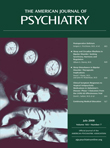Sleep Disturbance in Bipolar Disorder: Therapeutic Implications
Abstract
In this review, the authors detail our current understanding of the crucial role that sleep and its disturbances play in bipolar disorder. Multiple lines of evidence suggest that impaired sleep can induce and predict manic episodes. Similarly, treatment of sleep disturbance may serve as both a target of treatment and a measure of response in mania. The depressive phase of bipolar illness is marked by sleep disturbance that may be amenable to somatic therapies that target sleep and circadian rhythms. Residual insomnia in the euthymic period may represent a vulnerability to affective relapse in susceptible patients. Given the importance of sleep in all phases of bipolar disorder, appropriate evaluation and management of sleep disturbance in patients with bipolar illness is further detailed.



